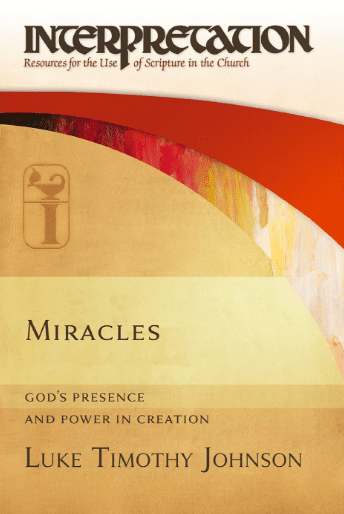 Luke Timothy Johnson, in Miracles: God’s Presence and Power in Creation, contends miracles in an age of secularity present enormous challenges that can only be countered with a concerted counter-challenge. I agree.
Luke Timothy Johnson, in Miracles: God’s Presence and Power in Creation, contends miracles in an age of secularity present enormous challenges that can only be countered with a concerted counter-challenge. I agree.
The challenge facing contemporary Christians in the matter of miracles is daunting. The condition of double-mindedness is pervasive and entrenched. Christians wishing to profess the central tenets of the faith—the convictions by which they live and for which, often enough, they die—cannot avoid mythic language. Incarnation and resurrection alike evade strictly historical categories. Because they speak of divine agency in the empirical realm, they demand the language of myth. The same believers, especially pastors and preachers, are profoundly shaped by the worldview of modernity. Secularism has no place for the miraculous. For many calling themselves Christian today, then, miracles are more than difficult: they are intellectually embarrassing. Recovering a singleness of heart, or perhaps better, a capacity to live creatively in the tension between distinct visions of the world, will not be easy.
It would be foolish to be overly optimistic about the future. The forces of secularization are astonishingly powerful. The message that the world is a closed system of cause and effect, that technological knowledge is the only kind that counts, that religion is nothing more than an evolutionary vestige rapidly being (or already) replaced by the powers of rational control—that message is broadcast by every available medium and affects us even, or perhaps especially, when we are unaware of being affected. To an ever-increasing degree, schools and universities collude in shaping the same secular outlook among the young. Traditional values and practices are those most easily and most often mocked by professors, while explicit expression of religious belief is treated as disruptive of the classroom s ‘rational” discourse and decorum. Despite the impressive research indicating that in first-world culture as in every other part of the world, religious belief in divine power continues to flourish (Stark 2015), one would never guess that was indeed so from the self-assured agents of secularism who declare that miracles are bogus, myth is falsehood, and religion is near dying.
Nothing less than a concentrated effort by the church can achieve even a countercultural foothold against the prevailing premises of modernity.(1)
But how? How can the church offer an alternative to secularity? What can it do? Johnson suggests it must be done in four areas:
Teaching: in the church’s catechism, which is an absolute necessity, he says, “we want Christians (1) to learn how to imagine the world that Scripture imagines, (2) how to cultivate a robust theology of creation, (3) how to hear and honor personal experience, and (4) how to appreciate the truth-telling qualities of myth.”
This, Johnson contends, must be done pervasively and without these four dimensions the teaching will not counter secularity.
Preaching: “Here the preacher has the unique opportunity, in the presence of the gathered faithful, to bring together the stories of God’s presence and power in lives today with the stories of God’s presence and power in Scripture.” He provides two of his sermons (transfiguration, St Michael and the angels) as illustrations of what he means.
Prayer: “Scripture and the experience of believers through the ages agree that prayer and miracles are intimately related. The reasons are clear enough. When we pray, we explicitly open ourselves to the presence and power that, we are convinced, is always implicit in creation. In prayer, we turn to that presence and power with mind and heart (and body). We make ourselves present to the one who is always present to us. By so doing, we open ourselves—and our part of the world—to the experience of divine power. … In prayer, we activate the world that is imagined by Scripture; we enter into it, now not simply as something we imagine, but as something we make empirically real.”
Pastoral Care and Counseling: “There are many aspects to pastoral care and counseling, but I here use the terms to cover all sorts of pastoral visitations and meaningful conversations, and I want to stress the listening dimension of such conversations rather than the speaking dimension. Such listening turns pastoral care from a primarily therapeutic activity to a hermeneutical practice. The one who listens can assist in the maieusis (midwifery) of revelation.”










